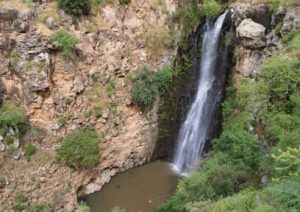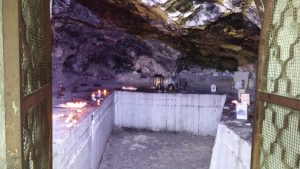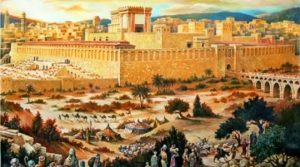On an excursion up north a number of years ago, an interesting thing happened. It’s not really all that surprising, though, considering how often hashgacha manifests itself in such an evident manner here in Eretz Yisrael. Pay close attention to the details of the story that you are about to read. That way, you’ll fully appreciate the amazing encounter that they led up to.
 We had a packed itinerary. First a hike to Jilabon Falls – a forty two meter waterfall hidden in between some really beautiful Golan mountains – then on to either a boat ride on the Kineret or the cable-car of Tzuk Manara in Kiryat Shmona, from there to Agam Ha’Chula (Hula Lake) to see all the migrating birds, and finally to Tzefat to visit kivrei tzaddikim and catch dinner at Mendi’s. It was a very windy day which made the skyline quite hazy, but that didn’t detract from the breathtaking effect of the waterfall as it cascaded down the imposing precipice.
We had a packed itinerary. First a hike to Jilabon Falls – a forty two meter waterfall hidden in between some really beautiful Golan mountains – then on to either a boat ride on the Kineret or the cable-car of Tzuk Manara in Kiryat Shmona, from there to Agam Ha’Chula (Hula Lake) to see all the migrating birds, and finally to Tzefat to visit kivrei tzaddikim and catch dinner at Mendi’s. It was a very windy day which made the skyline quite hazy, but that didn’t detract from the breathtaking effect of the waterfall as it cascaded down the imposing precipice.
Once back in the car, we decided on a boat ride in the Kineret. That meant heading south. We decided to call one of the boating places so they could expect us. “There are practically no boats going out today,” we were told, “owing to the water’s choppiness.” Although the polite gentleman offered to check into matters further and call us back if sending out a boat in the next hour would prove feasible, we decided to err on the side of caution and turned around to head further north towards the cable car in Kiryat Shmona. Baruch Hashem, it occurred to us that perhaps it would be prudent to call ahead to the cable car. Just in case. “Sorry, sir,” the helpful woman on the line told me, “the cable car is not operating today.”
What to do now? Well, if you’ve ever been to the Golan or Galil, you know that there is practically an endless list of attractions.
Parenthetically, if kedushas einayim is of concern to you – as it definitely should be – winter is a much, much better time to visit all these places. We had them practically to ourselves. Also, you don’t feel like you are going to wilt because of the heat.
In any event, we looked at the map and decided on Park Ha’Yarden, where you can have a picnic or go hiking around the absolutely stunning nature reserve that surrounds the Jordan River. We chose the shortest hike – five hundred meters in all – since we still wanted to make it to the Hula Valley Lake by 5:00 pm when we were told would be the best time to see all the migrant birds making their rest stop.
As it turned out, the short hike in Park Ha’Yarden requires you to actually walk in the river. But for those five hundred meters, it is not much more
In the midst of that impromptu activity, my leg brushed up against a sharp branch and it inflicted a somewhat deep cut. Nothing too serious. Upon returning to my car, I washed off the wound, wiped it with baby wipes (best I had!), dabbed on some Vaseline, and taped on a tissue.
Soon enough, we were back on the road heading north towards the Hula Valley Lake. About ten minutes into the drive, my wife and I marveled at the siyata d’Shmaya we merited to get that spared us a wasted drive down to the Kineret or up to Kiryat Shmonah.
Well, that made a bell go off in my head.
“Maybe I should call ahead,” I thought, “for this one as well.”
I did.
“Sorry sir,” I heard for the third time that day, “we are closed already; but you are welcome to come tomorrow morning.” It was a few minutes after four. Ok, so much for that idea. What to do instead? “Let’s just go straight to Tzefat,” my wife said, “that way, we won’t get back home too late.”
It turned out that we had only just passed the exit for Tzefat, and all we needed to do was make a U-turn less than a mile down the road. As I was about to make that turn, I noticed that there was a shopping center right off the highway, and one of the huge signs said “Beit Mirkachat”. Perfect! Now I could buy myself some rubbing alcohol and a proper bandage for the cut on my leg. Also, I could buy myself a towel (which I had forgotten to bring along) so that I could go to the mikveh in Tzefat before visiting the kevarim.
Once in the shopping center, we did a bit more shopping for this and that… you know how it goes. By the time we were ready to leave, Mincha was beckoning. Problem was, we really had no idea where we were, let alone where a Shul may be located. But, my habit of greeting and thanking oft-overlooked people such as street-cleaners, sanitation workers, and guards, saved the day.
My wife noticed that the guard I cheerfully greeted on the way in and out of the mall was wearing a yarmulke. I went over and asked him if there is a Shul in the area, and he directed me right up the road of the town, and told me I could find Beit Knesset Merkaz HaRav on the left side of the street. He even knew that they were starting to daven right then! It turned out that the town we were in was Chatzor Ha’Glilit, and on the way to the Shul I noticed a sign that seemed to be indicating that the kever of Choni Ha’meageil was in that area. Seeing that his story is one that I love repeating to my kids, I got excited by that discovery. The plan was to head out to Tzefat right after Mincha, but, for some reason, one of the locals asked me if I would like to stay for Maariv. “When is Maariv?” I asked. “6:00 pm.”
We really wanted to get moving already towards Tzefat, but a thought occurred to me. “Is the kever of Choni Ha’meageil near here?” I asked. “Sure, just drive all the way up the steep hill, and you can’t miss it,” the solicitous gentleman answered me. I still wasn’t sure why he wanted me there for Maariv… maybe to make sure there would be a minyan, I thought… although it seemed to me that there were more than enough people there… but, who knows, maybe Maariv is a tougher sell…?
No matter, I decided that I would like to make a quick visit to the kever of Choni Ha’meageil and then return to the Shul for Maariv before setting off for Tzefat. My wife graciously agreed, and that’s what we did.
Just one problem.
I really wanted to dunk in a mikveh before going to the kever. To my utter delight, there was a mikveh – named in memory of Choni Ha’meageil – just opposite the kever!
Serious technical difficulties with the hot water flow of the showers in addition to discovering that I had forgotten to remove my freshly applied band aid before immersing resulted in a significant delay. It was 5:58 pm by the time I exited the mikveh. What to do? Should I visit the kever and wait to daven Maariv in Tzefat, or daven Maariv and pass up on the opportunity to visit Choni Ha’meageil’s kever? I decided that it really didn’t make sense to push off davening Maariv. After Maariv, though, I still felt a strong desire to visit the kever. My wonderful wife acquiesced (she’s such a sport!), and for the second time in less than an hour we were ascending that steep hill.
When I entered the cave, I spent a few minutes just looking around and snapping a few pictures. Of course, I also recalled the famous story of Choni Ha’meageil, and based on that decided which perek of Tehillim would be just perfect for the occasion.
At some point, a couple of women entered the men’s side. Wearing pants no less. Actually, one of them had already been inside, and I overheard her being told by some man when she went outside that you’re not supposed to visit a kever twice in one day. Just as she ignored the sign indicating which side of the mechitza she should have been on, she also did not heed that warning. Well, seeing that my wife was dressed as modestly as could 
So I asked the other gentleman – a tall, dark-skinned fellow who seemed to me to be a local and regular visitor to the site – if women are allowed to come to the men’s side. “Really,” he answered, “they are not supposed to come to this side when men are here.” I kind of got the impression that he was indicating to me that I ought to tell those two pants-clad women to skedaddle. “I am not a balubas here, and it’s certainly not my place to enforce the rules,” I countered. “I also don’t like telling people what to do,” he responded, “it’s not good to use pressure and force… such things are far better done in a gentle way.”
I was still so excited about my thought of which perek of Tehillim would be most appropriate there, that I decided to share it with this fellow. “You know,” I told him, “I think that there is a particularly appropriate perek of Tehillim to recite here…”
He cut me off: “I just say whichever chapters I happen to open to.” Just so happens that that is usually how I do it as well, but I pressed on regardless. “The story of Choni Ha’meageil is one that everyone knows, but there is another story (in the same Gemara in Taanis 23a) that is less known.
The pasuk says, ‘A song of ascents when Hashem will return the captivity of Tziyon we will have been as dreamers (Tehillim 126:1).’ Choni was always bothered by this, seeing that it implies that it is technically possible for a person to sleep and dream for seventy years (the length of galus Bavel). So Hashem showed him that it is indeed possible.
One day, he was walking and came upon a man who was planting carob-tree seeds. ‘How long will it take for that tree to grow to maturity and produce edible fruit?’ Choni asked. ‘Seventy years,’ the man answered. ‘And you are certain that you will still be alive in seventy years from now?!’ Choni asked, incredulous. ‘I found a world with carob trees,’ the man volleyed back, ‘just as my ancestors planted them for me, so too am I planting them for my progeny.’
Thereafter, Choni sat down to eat, and sleep came upon him. A rock formation extended to surround him, and completely hid him from
He slept there for seventy years.
When he awoke, he saw that man picking carobs from the tree. ‘Are you the one who planted this tree?’ Choni asked. ‘No,’ the man answered, ‘I am the grandson of the one who planted it.’ ‘I see,’ Choni said, ‘that I just slept for seventy years!’
He then noticed that his donkey had become a whole herd of donkeys.
He went home and said to those there, ‘Is the son of Choni Ha’meageil still alive?’ ‘His son is not alive,’ they responded, ‘but his grandson is.’ He then told them, ‘I am Choni Ha’meageil!’ But they did not believe him. He went to the Beis Medrash, and (after he had participated for some time in the learned discussions) he heard the leading scholars say, ‘Wow, everything is crystal clear like it was in the time of Choni Ha’meageil! Whenever Choni would enter the Beis Medrash, he would answer whatever question the sages would present to him!’
‘It is I!’ Choni said to them. But they did not believe him, and they failed to accord him the degree of respect that he deserved. He felt awful. He davened [to be taken from this world], and he died.
Said Rava, ‘That is the meaning of the saying: chavrusa or misusa.’ Rashi explains: if one’s friends cease to treat him the way they always used to, he would rather die.
“So,” I concluded, “it makes a lot of sense to me to recite specifically this perek of Tehillim: Shir Ha’Maalos b’shuv Hashem es shivas Tziyon.”
By the time I finished my little presentation, there were two more men who had joined us in the cave, one of which was clearly learned as he rattled off the precise page in Taanis where this story of Choni Ha’meageil is recounted.
After hearing that, my initial audience of one offered a story of his own; the type of story that I always thought you only get to read in a book.
“You know, my name is Choni. So I have a special connection here. I am a baal teshuva, and it has not been an easy road. Although secular, my father was not the permissive type. He was strict and demanding. And I rebelled. My life became as deeply mired in bad stuff as could possibly be. The gan eiden of gehinnom, if you will. Drug dealing and the worst types of parties imaginable is what my life consisted of.
“One day, I was heading home from one of these parties at around ten or eleven am. I saw men clad in their talleisim, returning home from Shul, and something struck a very painful chord in my heart: ‘Look where these people are, and look where you are,’ I heard an accusing voice in my mind, ‘ok, so you are chiloni and not dati… but even for a chiloni you are so far gone!’
“The stark contrast was just too much for me. I made my way here to Choni Ha’meageil’s kever, put my head down on the tombstone, and started to cry bitter, bitter tears. ‘I want to do teshuva!’ I said, ‘But I can’t! It’s just too hard. I am way too deep in the muck. I have the same name as this great tzaddik. Somehow that must be able to mean something for me…’
“I went out to the parking lot, and not a soul was there. I started crying and sobbing even much harder than before. I cried out, ‘Creator of the universe! I don’t need your gan eiden or your gehinnom. Do with me what you will, but somehow, somehow, you’ve got to help me do teshuva!’ I can’t do it myself… but somehow, you’ve got to make it happen!’
“Not long thereafter, a friend of mine told me of an incredible ‘business opportunity’. A huge load of expensive drugs was being offered for immediate sale at half price. ‘No,’ I told him, ‘I am not interested.’ I wanted to escape from that world, not get deeper into it. ‘You’ve got to be kidding,’ he said, ‘this is a golden opportunity! We can make a killing off of this deal!’ He kept pressing me, and my resolve – which was not at all strong to begin with – wavered. I caved. I went along with the deal, but it wasn’t simple coming up with the cash. So I bought the first half of the stash and stored it in the meantime, while frantically trying to come up with the balance needed for the remainder.
“But that was not to be. It turned out that this was a sting operation, and I was picked up off the street by the cops while the negotiations of this deal were still under way. Not long into my sojourn with my fellow criminals, I came across a pamphlet in the jail that was entitled, ‘You are not alone.’ It was full of words of encouragement and emunah. All about how a Jew should realize that he’s never alone. Whatever situation he finds himself in, 
“At the moment, I was unable to recognize the obvious. But over time, it dawned on me. Eventually, the realization hit me with an incredible force! I had begged the Almighty to somehow pull me away from the horrible state of being into which I had sunk, and He did just that. Over the next six months in jail, I made a complete and total turnaround and reached levels of kedusha and closeness to Hashem that were previously unimaginable to me. Of course, the spiritual euphoria was like a grand building without any foundations, a multi-branched tree without any solid roots…
“For my excellent behavior, a third of the years that I was sentenced to were detracted from my mandatory jail stint. It actually was not at all that long ago that I was released. Since then, I’ve had a bunch of slips downward from my newfound spirituality. However, I have been gradually building myself up and have made great strides, baruch Hashem.”
Generally, I like to add a little commentary to a story, but this one needs none. Suffice it to say, I and the other two men listening to the story were

